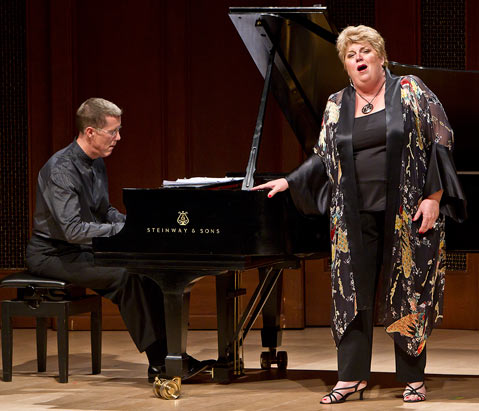Tuesdays @ 8 at Hahn Hall
Takacs Quartet and Alan Stepansky Play Schubert on Tuesday, July 26

The excitement in Hahn Hall ran high for this installment of the Music Academy’s faculty and guest artist chamber series. In addition to the Duet for Cello and Double Bass in D Major by Gioachino Rossini that offered a taste of what’s to come from this composer in the upcoming opera, there was a rare performance of Louis Spohr’s ambitious Quintet for Piano and Winds in C Minor, Op. 52. Wonderful as both these pieces were—and the Rossini had its ardent admirers, to be sure—neither was what all the fuss was about, because lurking on the second half of the program, all by itself, was that great gorilla of the chamber music repertoire, the String Quintet in C Major, Op. 163, D. 956 of Franz Schubert. As played by Academy guest artists the Takács Quartet and cellist Alan Stepansky, this astounding piece of music reasserted its perennial claim to being among the very finest works of any kind ever composed.
Cellist Stepansky thus had quite a busy evening. He and Nico Abondolo roared through the frisky, festive, and at times even humorous Rossini duet with panache. They dedicated the performance to Stepansky’s mother on the occasion of her birthday, and it made for a glorious present, with its bravura bass part and dancing melodic lines for the cello. Rossini’s operatic temperament was hinted at just enough to whet the appetite for his The Barber of Seville, which opens at the Granada on August 5.
Spohr, although not often heard from today, was among the elite of European conductors and violinists in the heyday of Beethoven and Schubert. In addition to composing a significant body of work, Spohr invented the violin chin rest and was the first conductor to use a baton. His Quintet for Piano and Winds in C Minor, Op. 52 is scored for flute, clarinet, bassoon, horn, and piano, and for the performance on Tuesday, these instruments were played by Timothy Day (flute), Richie Hawley (clarinet), Benjamin Kamins (bassoon), Eli Epstein (horn), and Jonathan Feldman (piano). A group this good can make almost anything sound special, and with the Spohr, there was an element of challenge, as his style, which looks back to Mozart and Vienna while encompassing some aspects of later 19th-century music, can be hard to locate, and thus relate to, for the contemporary audience. Still, there were some grand entrances, in particular for the horn and the bassoon, both of which were given the opportunity to respond solo to extended sections for piano.
When Schubert wrote the Quintet for Strings in 1828, he was nearing the end of his all-too-short life, and, ever since his death, much has been made of the connection between this exquisite piece and his state of mind at the time of its composition. While the theory that it reflects Schubert’s experience of grief and its classic stages makes for a fascinating subtext to the immediacy of listening, it’s no substitute for the simple and direct pleasure of letting the music do its work. The Takács Quartet—Edward Dusinberre (violin), Károly Schranz (violin), Geraldine Walther (viola), and András Fejér (cello)—made brilliant work of it, burnishing the entire 52-minute piece with the shapeliest vibrato imaginable. The audience’s excitement at the outset paid off, as the group was called back for three standing ovations on this very memorable night at Hahn Hall.



